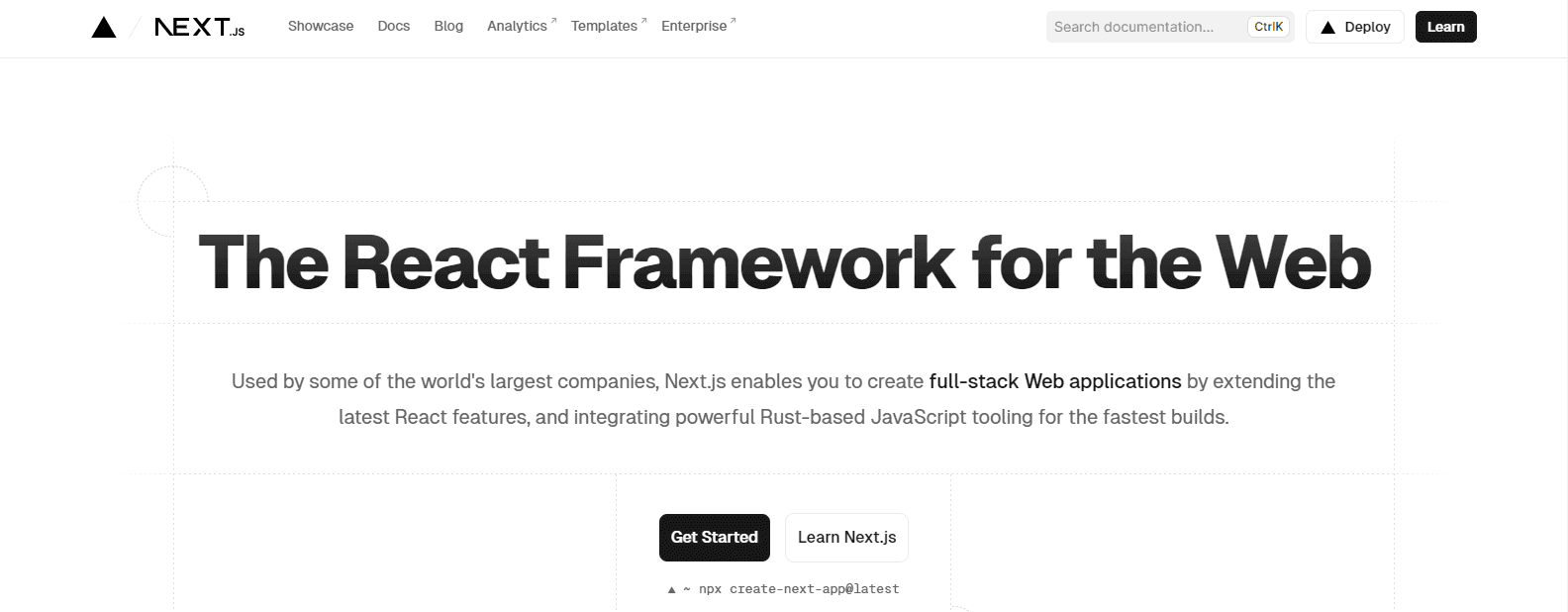Next.js SEO: Search Engine Visibility For Next.js Sites With Content From Strapi or Kontent.ai
- User Experience

Mastering Next.js SEO is the key to ensuring unparalleled search engine visibility, and in this blog post, we'll explain why.
Join Kapsys as we explore the intricacies of optimizing SEO across platforms, focusing on the dynamic capabilities of Next.js and the seamless integration of robust content management systems like Strapi or Kontent.ai.
What is Next.js SEO?
Next.js, a dynamic React framework, stands at the forefront of modern web development. Its server-side rendering (SSR) capabilities empower developers to create visually stunning and highly performant web applications.

Understanding how to harness the full potential of Next.js for SEO is crucial for achieving top-notch search engine visibility.
The core functionality of Next.js SEO
Next.js SEO meets technical SEO requirements and provides a competitive edge by delivering a fast, responsive, and user-friendly website experience:
Automatic code splitting: SEO employs automatic code splitting, dynamically breaking down JavaScript code. This significantly accelerates page loads by loading only essential code initially.
Cooperation with content management: Utilizing a CMS like Strapi or Kontent.ai helps to organize and deliver content, aligning with code-splitting principles efficiently.
Propelling your website: A fast-loading website with well-structured content stands out in the digital landscape. Also, integrating Next.js code splitting and robust CMS contributes to SEO success.
Continuous optimization for success: Evolve with the digital landscape by updating content and monitoring performance metrics. Next.js SEO Ensures sustained SEO excellence and a superior user experience.
Leveraging Next.js SEO for Maximum Impact
To fully leverage Next.js SEO, it's imperative to incorporate best practices throughout the development process:
Dynamic page titles and meta descriptions
As part of your Next.js SEO strategy, craft compelling and dynamic page titles and meta descriptions incorporating relevant key phrases. These dynamic elements engage users and signal relevance to search engines.
Mobile responsiveness
With mobile devices dominating web traffic, ensuring your Next.js application is responsive and optimized for mobile-first indexing is crucial for Next.js SEO success.
Structured data markup
Implement structured data markup to provide search engines with context about your content. This can lead to enhanced visibility through rich snippets in search results.
XML sitemaps for Next.js SEO
Generate XML sitemaps to guide search engines through the hierarchy of your Next.js site. This aids in efficient crawling and indexing.
Now, let's delve into the union between Next.js SEO and content management systems to elevate your SEO game.
Strapi vs. Kontent.ai for Next.js SEO
When elevating Next.js SEO to new heights, choosing a content management system (CMS) is pivotal. In this comparison, we'll explore two contenders: Strapi and Kontent.ai.
Each offers unique features, seamlessly integrating with Next.js SEO to create a powerful combination of content management and SEO optimization.
Next.js SEO with Strapi: A Dynamic Duo
Strapi, renowned as an open-source headless CMS, forms a dynamic duo with Next.js. This integration goes beyond content management, providing a robust foundation for SEO excellence.
Strapi features for Next.js SEO
Let's delve into the specific features that make Strapi a compelling choice :
Customizable Content Types: Strapi allows the creation of custom content types, ensuring that your Next.js site aligns perfectly with your SEO strategy.
SEO-Friendly URLs: Configure SEO-friendly URLs effortlessly, optimizing the structure of your Next.js SEO.
Content Versioning: Maintain a transparent history of content changes, enhancing accountability and the ability to roll back content if necessary.
Read: How Vercel Enhances Next.js and Strapi Application Deployment

Kontent.ai and Next.js SEO
While Strapi offers a solid foundation, Kontent.ai enters the arena with a cloud-based approach to content delivery.
Kontent.ai features for Next.js SEO
Seamlessly integrating with Next.js SEO, Kontent.ai brings unique features to the table, streamlining content creation and distribution for optimal SEO performance:
Global Content Delivery: Leverage Kontent.ai's global content delivery network to enhance page load times and positively impact SEO rankings.
Content as a Service (CaaS): The Content as a Service model of Kontent.ai decouples content creation from presentation, providing flexibility and scalability to your Next.js application.
Automatic Image Optimization: Kontent.ai automatically optimizes images, reducing page load times and contributing to superior SEO performance.

Whether it's the customizable prowess of Strapi or the cloud-powered innovations of Kontent.ai, the decision lies in aligning these features with your unique Next.js SEO objectives and content management needs.
Read: Benefits Of Using Kontent.ai As A Content Management Solution
The Impact of 'No-Index' Strategies in Next.js SEO
In the dynamic world of Next.js SEO, the strategic use of 'no-index' meta tags can significantly impact your site's visibility in search engine results.
The "no-index" strategy is a directive used in the meta tags of a webpage to instruct search engines not to index the content of that specific page.
When a page is indexed, search engines include the page in their database, making it eligible to appear in search engine results pages (SERPs).
When to apply 'no-index' in Next.js SEO
In some situations, webmasters may not want certain pages to be indexed, leading to implementing the "no-index" strategy. Here's what you would like to hide in Next.js SEO:
Managing Duplicate Content: Strategically use 'no-index' for pages with similar content to avoid SEO complications arising from duplicate content.
Securing Private Pages: Pages meant for internal use or containing sensitive information can be set to 'no-index' to safeguard them from appearing in search engine results.
Optimizing Thank You Pages: Apply 'no-index' to thank you or confirmation pages to prevent them from cluttering search results.
Pages with Thin or Low-Quality Content: Pages with minimal or low-quality content may not provide users value or meet search engine quality guidelines.
Strategically implementing 'no-index' ensures control over what search engines index, maintaining a healthy Next.js SEO profile.
Read: How To Build A Multilingual Site With Next.js
Best Practices for Next.js SEO with Strapi or Kontent.ai
Ensuring that your Next.js site achieves optimal search engine visibility involves more than just integrating a robust CMS. This section will explore critical practices to elevate your Next.js SEO game.
Power of automatic sitemaps
Both Strapi and Kontent.ai offer features for the automatic generation of sitemaps. This ensures that search engines can efficiently navigate and index all relevant pages on your Next.js site.
Image optimization for Next.js SEO efficiency
Images play a pivotal role in user engagement and SEO. Ensure that images are optimized for both performance and search engines. Kontent.ai's automatic image optimization is a standout feature in this regard.
Read: Using next/image: Comprehensive Guide To Next.js Image Optimization
Canonical URLs
When dealing with dynamic content or multiple URLs leading to the same content, specify canonical URLs. This informs search engines about the preferred version, preventing SEO issues related to duplicate content.
Regular monitoring of Next.js SEO performance
Utilize tools like Google Analytics or SEO monitoring platforms to track the performance of your Next.js site. Regular monitoring identifies areas for improvement, ensuring that your SEO strategy remains effective.
Quality content creation
Create high-quality, relevant content regularly. Search engines prioritize fresh and valuable content, contributing to improved rankings.
Stay informed about Next.js SEO trends
The digital landscape is dynamic, and SEO algorithms continually evolve. Stay informed about the latest Next.js SEO trends and updates to adapt your strategy accordingly.
Incorporating these strategies into your Next.js SEO approach with a robust CMS like Strapi or Kontent.ai positions your website for sustained visibility and success in the competitive digital landscape.
Read: SEO Best Practices In Next.js Applications: Search-Engine Friendly

Conclusion
Mastering Next.js SEO is an advantage and a necessity for digital success. With the powerful SSR capabilities of Next.js, combined with the seamless integration of Strapi or Kontent.ai, your website can reach new heights of search engine visibility.
Understanding the nuances of 'no-index' strategies, sitemaps, and best practices ensures that your Next.js site attracts and retains the attention of search engines, driving organic traffic and contributing to your overall digital success.
Embrace the union of Next.js and a powerful CMS, and unlock your website's full potential in search engine visibility.
Stay tuned with Kapsys for more actionable insights!


